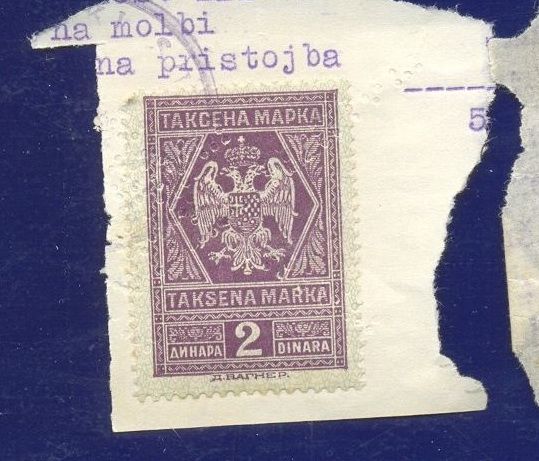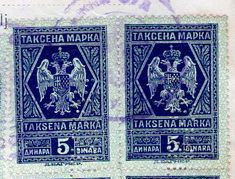LizzieMaine
Bartender
- Messages
- 34,212
- Location
- Where The Tourists Meet The Sea
After January 1, 1937, you were required to have a Social Security card to have any non-government job that paid a wage -- granted, there were plenty of cash-under-the-table farm/common laborer positions one could get if one was inclined and physically capable, but anything higher up the ladder would have required one to establish one's bona fides. Employers were required to keep careful account of their employee's Social Security deductions, and if you couldn't show a card, you had to get one pronto. By the end of 1936, 600,000 applications a day were being processed, so this was a very big deal.
To get a card, applicants had to fill in a form which asked for complete birth information -- date, place, mother's maiden name, etc. -- but here's where you could get lucky. Applications were not processed centrally -- they were handled by regional offices, and each office might have different procedures on verification. In some, you might be able to get away with just stating the facts under oath -- in others, run by stricter by the book types, you'd be required to show some proof of identity: a birth certificate, a naturalization certificate, a passport, or some other verification of who you were and where you came from.
It might be a good thing, then, to arrive in 1936 -- because with such a huge rush of applications during December 1936, it was very easy for field workers to just rush thru the application process and not be especially strict about documentation. Arriving later might mean trouble.
As for ration books, it wasn't just meat, sugar, coffee, shoes and such that were on the ration -- by spring of 1943, cooking oils and fats, many fruits and vegetables, and most canned goods were also subject to rationing, and the OPA was getting strict about enforcement. Showing up during the war without a valid ration book -- or a good forgery of same -- could mean some hungry nights unless your first step was to make friends with the local black marketer.
You'd never get a reputable office job without references, either letters of recommendation or people who could verbally verify you were who you said you were. Again, one could forge letters, but there's always the chance the company might try to verify them -- and if you arrived in wartime, forged letters could get you some uncomfortable moments answering questions you didn't want to answer. An easy way to get such references would be to, as soon as you arrived, sign up with a business school and take some courses in general office procedure, typing, accounting, shorthand, and such things as that. You didn't need to verify identity to take such courses, they generally weren't all that expensive, and upon completion you'd get a certificate and letter of reference. It'd take a few months of your time, and you'd have to have some other means of support until finishing the course, but it'd be a very smart investment. Anybody who could type could get a job.
Proof of registration and classification was required to be carried by every man of draft age during the war -- if you were stopped by the police for any reason, it had to be shown. You surrendered your draft card on induction into the service, so if you were stopped by police, were in civilian clothes, were of draft age and couldn't show your draft card they'd assume you were AWOL. You wouldn't want that to happen. And even if you didn't get sent off to a military stockade, you'd be facing a stretch of one to five years in prison for failing to register. Not a good way to get your new life started.
A passport in the United States required presentation of a birth certificate, baptismal record, or "other acceptable verification of identity" as far back as World War 1. "Other Acceptable Verification" could take the form of letters from two people who knew you, but again, be careful with forgeries. Most people didn't have passports, and didn't need passports, so this was less of an important detail than it would be today.
To get a card, applicants had to fill in a form which asked for complete birth information -- date, place, mother's maiden name, etc. -- but here's where you could get lucky. Applications were not processed centrally -- they were handled by regional offices, and each office might have different procedures on verification. In some, you might be able to get away with just stating the facts under oath -- in others, run by stricter by the book types, you'd be required to show some proof of identity: a birth certificate, a naturalization certificate, a passport, or some other verification of who you were and where you came from.
It might be a good thing, then, to arrive in 1936 -- because with such a huge rush of applications during December 1936, it was very easy for field workers to just rush thru the application process and not be especially strict about documentation. Arriving later might mean trouble.
As for ration books, it wasn't just meat, sugar, coffee, shoes and such that were on the ration -- by spring of 1943, cooking oils and fats, many fruits and vegetables, and most canned goods were also subject to rationing, and the OPA was getting strict about enforcement. Showing up during the war without a valid ration book -- or a good forgery of same -- could mean some hungry nights unless your first step was to make friends with the local black marketer.
You'd never get a reputable office job without references, either letters of recommendation or people who could verbally verify you were who you said you were. Again, one could forge letters, but there's always the chance the company might try to verify them -- and if you arrived in wartime, forged letters could get you some uncomfortable moments answering questions you didn't want to answer. An easy way to get such references would be to, as soon as you arrived, sign up with a business school and take some courses in general office procedure, typing, accounting, shorthand, and such things as that. You didn't need to verify identity to take such courses, they generally weren't all that expensive, and upon completion you'd get a certificate and letter of reference. It'd take a few months of your time, and you'd have to have some other means of support until finishing the course, but it'd be a very smart investment. Anybody who could type could get a job.
Proof of registration and classification was required to be carried by every man of draft age during the war -- if you were stopped by the police for any reason, it had to be shown. You surrendered your draft card on induction into the service, so if you were stopped by police, were in civilian clothes, were of draft age and couldn't show your draft card they'd assume you were AWOL. You wouldn't want that to happen. And even if you didn't get sent off to a military stockade, you'd be facing a stretch of one to five years in prison for failing to register. Not a good way to get your new life started.
A passport in the United States required presentation of a birth certificate, baptismal record, or "other acceptable verification of identity" as far back as World War 1. "Other Acceptable Verification" could take the form of letters from two people who knew you, but again, be careful with forgeries. Most people didn't have passports, and didn't need passports, so this was less of an important detail than it would be today.
Last edited:





